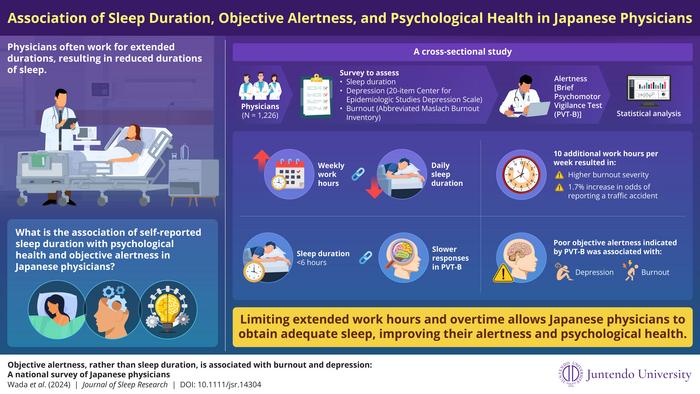Summary: A groundbreaking Japanese study of over 1,200 physicians reveals concerning links between extended work hours, reduced sleep, and declining mental health. The research comes as Japan implements new overtime restrictions for doctors, though researchers suggest stricter limits may be needed. The study found that objective measures of alertness could be valuable indicators of physician burnout and depression.
Journal: Journal of Sleep Research, August 12, 2024
DOI: 10.1111/jsr.14304
Reading time: 4 minutes
A Critical Look at Physician Work Hours
As healthcare providers work to save lives, their own wellbeing often suffers from long shifts and limited sleep. In response to these concerns, Japan has implemented new regulations in 2024 limiting physician overtime to 960 hours annually, with some exceptions allowing up to 1,860 hours for rural doctors and medical trainees.
To understand the impact of work hours on physician health, researchers surveyed 1,226 Japanese doctors, measuring their sleep patterns, alertness, and psychological wellbeing.
Measuring the Impact of Sleep Loss
“We believe that the PVT is a key tool to objectively assess alertness levels of essential workers, since self-reported alertness is inaccurate at identifying those with sleep debt,” explains Dr. Hiroo Wada of Juntendo University.
The study found that as weekly work hours increased, daily sleep decreased. More concerning, additional duty hours correlated with increased burnout severity and higher accident risks.
The Case for Stricter Limits
“The stricter 960-hour annual overtime cap will likely benefit Japanese physician sleep and mental health,” notes Dr. Mathias Basner, Professor at the University of Pennsylvania. However, he suggests that future studies will need to determine if even stricter caps are necessary.
Dr. Takeshi Tanigawa emphasizes a crucial point about the current policy: “Almost doubling the overtime cap for physicians and for medical trainees who serve rural areas may make sense from an administrative perspective but makes little sense from a public health and safety perspective. The same cap should apply to all physicians regardless of the sector they work in or their career progression.”
Glossary
- Psychomotor Vigilance Test (PVT): An objective tool used to measure alertness and attention
- Burnout: A state of physical, emotional, and mental exhaustion resulting from prolonged stress
- Sleep debt: The cumulative effect of not getting enough sleep
- Overtime cap: A regulatory limit on the number of extra hours worked beyond standard hours
Knowledge Check Quiz
- Question: What is the new annual overtime limit for most Japanese physicians?
Answer: 960 hours - Question: How many physicians participated in this study?
Answer: 1,226 Japanese physicians - Question: What was the higher overtime limit set for rural doctors and medical trainees?
Answer: 1,860 hours annually - Question: What key relationship did the study find between work hours and sleep?
Answer: Daily sleep duration was inversely related to weekly work hours
Enjoy this story? Get our newsletter! https://scienceblog.substack.com/


